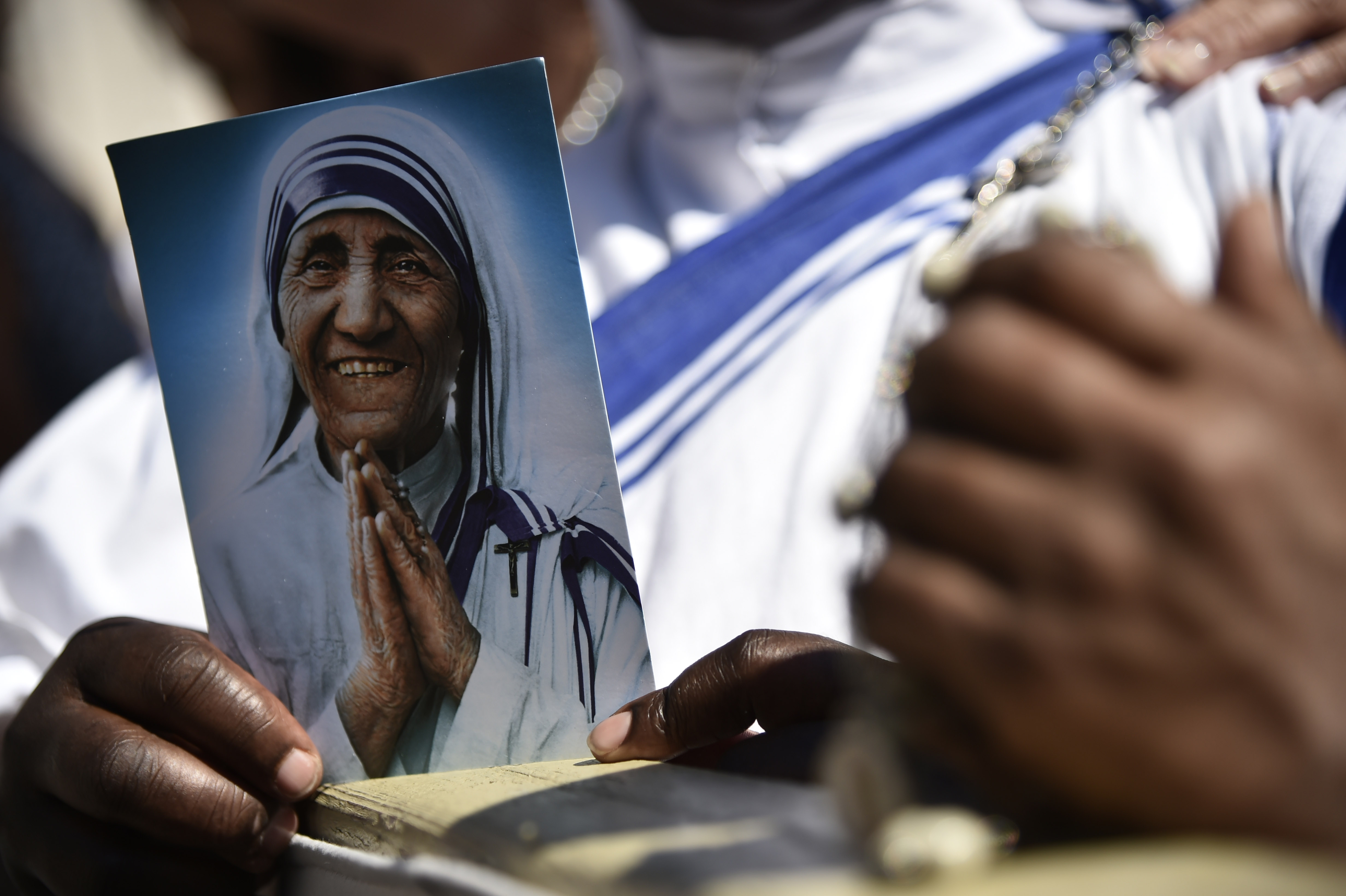Canonization
On Sunday September 4 at 10:41 Pope Francis proclaimed saint Mother Teresa of Calcutta “a generous dispenser of divine mercy, making herself available for everyone through her welcome and defence of human life, those unborn and those abandoned and discarded”

On September 4, at 10:41 Pope Francis elevated to the altar Mother Teresa of Calcutta, born Gonxha Agnes Bojaxhiu. His Holiness recited the formula for canonization with which he declared the small “pencil of God” born in 1910 in Skopje to Albanian parents, died in Calcutta in 1997, founder of the Congregation of the Missionaries of Charity, a Saint of the Catholic Church. The proclamation was received with a long applause by over one hundred thousand faithful who filled St. Peter’s Square for the occasion since the early morning hours. On the façade of the Vatican Basilica stood out the arras with the smiling image of Mother Teresa. The celebration began with a long procession of the co-celebrants: 70 cardinals, 400 bishops and over 1700 priests from world countries. Mass was attended, inter alia, by heads of Government and State. Immediately after the canonization the cross-shaped reliquary, surmounted by a large heart in the colours of the saris worn by the Missionaries of Charity, was brought to the altar.
Near the last. “Mother Teresa, in all aspects of her life, was
a generous dispenser of divine mercy,
making herself available for everyone through welcome and the defence of human life, those unborn and those abandoned and discarded.” This is the secret of the sanctity of the small nun of Albanian origin, Pope Francis explained in the homily. In fact, the founder of the Missionaries of Charity “was committed to defending life, ceaselessly proclaiming that ‘the unborn are the weakest, the smallest, the most vulnerable’.” Not only. “She bowed down before those who were spent, left to die on the side of the road, seeing in them their God-given dignity”
she made her voice heard before the powers of this world, so that they might recognize their guilt – their guilt! – for the crime of poverty they created.”
For the new saint “mercy was the “salt” which gave flavour to her work, it was the “light” which shone in the darkness of the many who no longer had tears to shed for their poverty and suffering.”
Eloquent witness. The “mission” of Mother Teresa of Calcutta “to the urban and existential peripheries remains for us today an eloquent witness to God’s closeness to the poorest of the poor”, the Pope then pointed out, passing on “this emblematic figure of womanhood and of consecrated life to the whole world of volunteers: may she be your model of holiness!.” The canonization of the founder of the Missionaries of Charity is the highlight of the Jubilee dedicated to the sector of volunteer work and charity workers, held in Rome September 2-4. Pope Francis then added: “People may struggle to refer to her as Saint Teresa, her holiness is so close to us that fruitful and spontaneous that with great spontaneity, I think we will continue to call her Mother Teresa,” he said. Francis said he hopes that “this tireless worker of mercy may help us to increasingly understand that our only criterion for action is gratuitous love, free from every ideology and all obligations, offered freely to everyone without distinction of language, culture, race or religion.” The Pope recalled that Mother Teresa loved to say: “Perhaps I don’t speak their language, but I can smile”-, the Pope concluded:
“Let us carry her smile in our hearts and give it to those whom we meet along our journey, especially those who suffer.
In this way, we will open up opportunities of joy and hope for our many brothers and sisters who are discouraged and who stand in need of understanding and tenderness.”
Prayers for the poor and the persecuted. During Mass, prayers were recited for the poor and for the last, so that all Christians, following the footsteps of Mother Teresa, may carry out active works of charity. A prayer calling upon governments and legislative assemblies to defend the life and dignity of every human person, whilst promoting peace and justice, along with prayers for persecuted Christians in Chinese, were recited in Bengali. The offertory procession was attended also by Marcílio Haddad Andrino, the Brazilian engineer miraculously healed through the intercession of Mother Teresa of Calcutta.
Pizza for 1500 people. Just like the life of Mother Teresa was close to prayer and action for the poor, yesterday was also marked by a concrete gesture. After the canonization Mass Pope Francis offered a Neapolitan-style pizza lunch to 1500 people in the atrium of the Paul VI Hall. All the guests were poor and needy people, above all from the dormitories of the Sisters of Mother Teresa and come from all over Italy,” including Milan, Bologna, Florence, Naples and from all the houses in Rome. They travelled overnight on several buses to attend the canonization ceremony and then the lunch. The lunch was served by approximately 250 Mother Teresa Sisters, 50 Brothers from the male branch of the Congregation, and other volunteers. The pizza was cooked by a Neapolitan pizzeria with its staff consisting of almost 20 people and with their mobile equipment (three stoves).